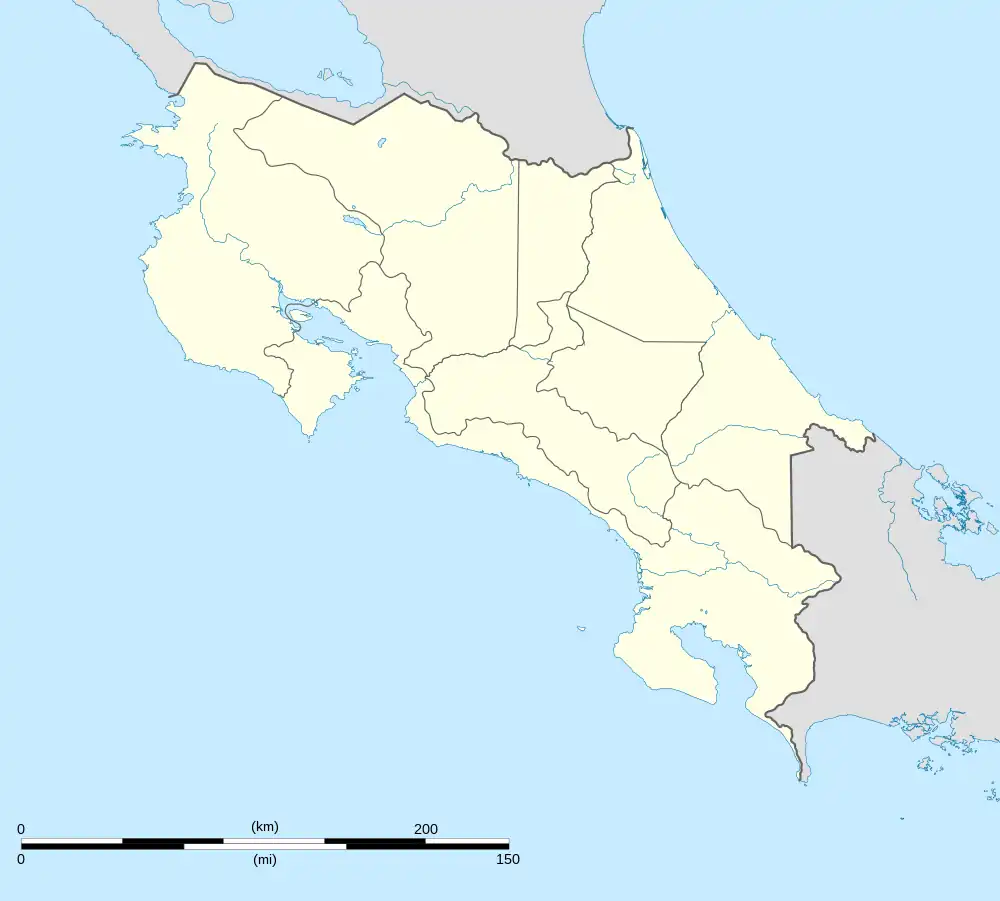Cariari | |
|---|---|
Cariari district | |
 Cariari Cariari district location in Costa Rica | |
| Coordinates: 10°26′06″N 83°41′06″W / 10.4349389°N 83.6850718°W | |
| Country | |
| Province | Limón |
| Canton | Pococí |
| Creation | 2 July 1971 |
| Area | |
| • Total | 200.96 km2 (77.59 sq mi) |
| Elevation | 50 m (160 ft) |
| Population (2011) | |
| • Total | 34,176 |
| • Density | 170/km2 (440/sq mi) |
| Time zone | UTC−06:00 |
| Postal code | 70205 |
Cariari is a district of the Pococí canton, in the Limón province of Costa Rica.[1][2]
History
Cariari was created on 2 July 1971 by Decreto Ejecutivo 1825-G. Segregated from Guápiles.[2]
Geography
Cariari has an area of 200.96 km²[3] and an elevation of 50 metres.[1]
The territory of Cariari is largely flat.[4]
Seen from above, the terrain of Cariari appears on the flat side as a savannah, with the intense green of the banana trees standing out in many areas; And with large unpopulated extensions, and sites that show innumerable rivers and pipes.
The homonymous head is a rural town in expansion both commercial and agricultural level, located to about 23 kilometers to the north of the city of Guápiles and 109 km to the northeast of San José, the nation's capital.
Weather
The climate of the district is humid and hot for most of the year; however, there are no stifling temperatures, and this is an attraction for tourism.
Demographics
| Historical population | |||
|---|---|---|---|
| Census | Pop. | %± | |
| 1973 | 6,848 | — | |
| 1984 | 11,576 | 69.0% | |
| 2000 | 28,080 | 142.6% | |
| 2011 | 34,176 | 21.7% | |
|
Instituto Nacional de Estadística y Censos[5] |
|||
For the 2011 census, Cariari had a population of 34,176 inhabitants. [7]
Settlements
The population centers of the district are:
- Head town: Cariari
- Neighborhoods (Barrios): San Juan, Guaria, Las Orquídeas, Los Hermanos, La Urba
- Villages (Poblados): Astúa-Pirie, Caribe, Banamola, Boca Guápiles (part), Campo Cuatro, Campo Dos, Campo Tres, Caño Chiquero, Carolina, Ceibo, Coopecariari, Cuatro Esquinas, Formosa, Frutera, Hojancha, Los Angeles, Nazaret, Palermo, Pavona, Progreso, Pueblo Triste, Sagrada Familia, Semillero, Zacatales
Transportation
Road transportation
The district is covered by the following road routes:
Economy
In this region there are a large number of banana farms (80% of the Pococi canton), linked together by a vast network of roads, mostly gravel or ballast roads.
At present (as in the rest of the canton), the main economic activities are Agricultural sector: crops Extensive agriculture of banana and pineapple, the sowing of basic grains and livestock.
There are regions of great tourist interest for the beauty of the landscape, in which rural and ecological tourism could be promoted directly.
References
- 1 2 "Declara oficial para efectos administrativos, la aprobación de la División Territorial Administrativa de la República N°41548-MGP". Sistema Costarricense de Información Jurídica (in Spanish). 19 March 2019. Retrieved 26 September 2020.
- 1 2 División Territorial Administrativa de la República de Costa Rica (PDF) (in Spanish). Editorial Digital de la Imprenta Nacional. 8 March 2017. ISBN 978-9977-58-477-5.
- ↑ "Área en kilómetros cuadrados, según provincia, cantón y distrito administrativo". Instituto Nacional de Estadística y Censos (in Spanish). Archived from the original on 24 October 2020. Retrieved 26 September 2020.
- ↑ "Sustainable local development of Pococí" (PDF). Municipality of Pococí. Archived from the original (pdf) on 2016-11-29. Retrieved 2017-08-24.
- ↑ "Instituto Nacional de Estadística y Censos" (in Spanish).
- ↑ "Sistema de Consulta de a Bases de Datos Estadísticas". Centro Centroamericano de Población (in Spanish).
- ↑ "Censo. 2011. Población total por zona y sexo, según provincia, cantón y distrito". Instituto Nacional de Estadística y Censos (in Spanish). Retrieved 26 September 2020.